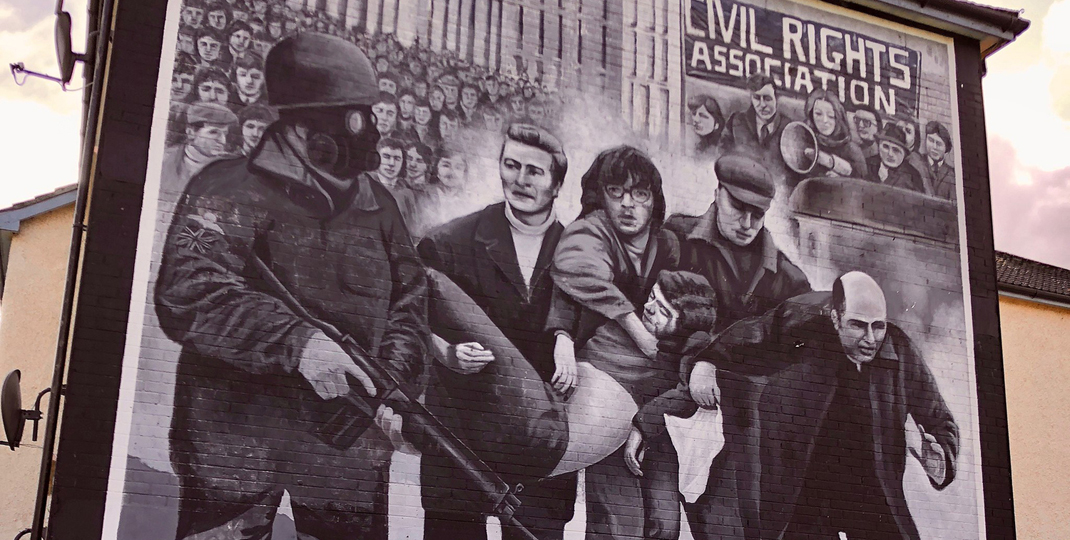A mural in Derry commemorating Bloody Sunday.
The Boston College Irish Studies program will mark the 50th anniversary of “Bloody Sunday”—a tragic milestone in the decades-long Northern Irish conflict, “The Troubles”—with a symposium on February 18 and 19 that will examine the events of the fatal day and its legacy.
On January 30, 1972, British paratroopers opened fire on a protest march for civil rights in the Bogside area of Derry, Northern Ireland, shooting 26 unarmed Catholic civilians, 14 of whom died. Bloody Sunday—which is still memorialized by the Bogside community—became a foundational moment for The Troubles and its repercussions continued to reverberate over the following decades. Unsatisfied by a flawed tribunal, the bereaved families launched a campaign demanding truth and justice. As part of the peace process that led to the Good Friday Agreement, in 1998 a Bloody Sunday inquiry was established and, following a lengthy and comprehensive investigation, in 2010 the British prime minister David Cameron issued a public apology.
The BC symposium will include screenings of two dramatic films based on Bloody Sunday and presentations by Julieann Campbell, an award-winning author—and niece of a Bloody Sunday victim—whose new book on the tragedy will be formally launched during the event; political scientist and historian Niall Ó Dochartaigh, a researcher of the Northern Irish civil rights movement; and Salem State University historian Margo Shea, whose book Derry City: Memory, and Political Struggle in Northern Ireland was published last year.
BC speakers will include Sullivan Professor of Irish Studies Guy Beiner and Robert Savage, interim director of the Irish Studies program, speaking as part of a panel chaired by Rachel Young, a Ph.D. candidate in history.
“Derry’s Bloody Sunday in 1972 has a universal relevance as it relates to other events in which state forces used excessive violence against civilian protesters,” said Beiner, who will speak on “Bloody Sundays: Remembrance of State Violence Against Civilian Protest” and introduce “Sunday,” a 2002 film directed by Charles McDougall and written by Jimmy McGovern that narrates the events from the point of view of the families of the dead and the injured.
“Television images of the shootings were broadcast around the world undermining the British narrative that its soldiers were in Northern Ireland to keep the peace. Televised reports spoke of a massacre of civil rights marchers provoking international outrage that damaged Britain’s standing as a leading global democracy,” said Savage, whose presentation is titled “Televised Terror: The BBC’s Coverage of Bloody Sunday.” He also will offer an introduction to the 2002 Paul Greengrass film “Bloody Sunday” that was inspired by the Don Mullan book Eyewitness Bloody Sunday.
In addition to her talk “Bloody Sunday: Then and Now,” Campbell will launch for United States readership her book On Bloody Sunday: A New History of the Day and its Aftermath by Those Who Were There as part of a memorial tribute in Connolly House that will close the symposium. That event also will recognize Shea’s Derry City and Ó Dochartaigh’s Deniable Contact: Back-Channel Negotiation in Northern Ireland, published last year.
Advance registration is required. The symposium schedule and registration links are available through the Irish Studies website.
Sean Smith | University Communications | February 2022




